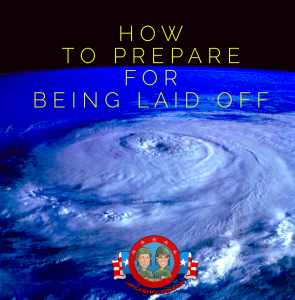
Being laid off can be a traumatic and stressful time. It’s often unexpected and most always undesirable.
Sometimes a paycheck stopping or being reduced is only temporary, as was the case for Peter and me during 2013. Both of us being federal employees experienced a couple furloughs during that year due to the U.S. budget crisis and congressional deadlock.
The first furlough occurred during that summer where we took an unpaid day off each week. The second furlough occurred during the government shutdown that autumn. Fortunately it didn’t last long and hasn’t happened since, but it was a wakeup call.
The best time to prepare for the worst is before the worst occurs.
Here are some suggestions on how you can prepare for a reduction or loss of your income.
- Build a Savings Account
You don’t buy insurance after an accident occurs. There is no stocking up on supplies once the hurricane hits your doorstep.
If you want to figure out how financially healthy you are, there is a very simple question to ask yourself… If your paycheck stopped suddenly, how long could you survive without missing any bills or meals?
For most people, it’s not very long unfortunately.
MarketWatch reported on a study in December 2015 that stated, “62% of Americans have less than $1,000 in their savings account and 21% don’t even have a savings account.”
That means that if a paycheck stops for most Americans, they will have to immediately choose what bills do and don’t get paid that month. Doing this will likely cause serious harm to their credit history.
Worse still, people might be tempted to use their credit card to stay afloat. While this provides short-term relief, in the long-term it sets the stage for a perpetual cycle of debt and financial struggle.
Losing a paycheck may not even be the problem. Perhaps a major and unexpected expense is. Medical co-payments and unexpected car repairs happen.
Again, the equation is simple: Money in the bank buys you time to get back on your feet.
How much time you buy depends upon how committed you are to saving. The best way to start is to make the amount something you can comfortably sock away every month and make it automatic.
Financial commentators like Suze Orman have suggested a savings equal to 6 months of take home salary. While this is a good goal, simply start with what you can reasonably accomplish.
The discipline of not touching that money is the harder part, but when you are tempted, spend some time imagining what it would feel like when your paycheck stops and you didn’t have that cash available. If this happened to you in the past, think about how you felt during those previous occurrences.
Even unemployment checks can take a month to get started, so you absolutely need a buffer.
- Don’t rely on only one stream of income
Having multiple streams of income gives you options. For most of us, a W-2 wage earning job is the primary source of income. Remember that there are income streams available beyond this.
Some require a little hustle on your part. If you have the energy, a secondary part-time job might be the answer.
If you have the entrepreneurial spirit and the energy, a part time business might be the way to go. You could either offer your services for hire or you can sell products. Here at JPCashFlow, entrepreneurship is one of our preferred routes.
Maybe investment income could add monthly cash flow. There are many different kinds: dividends, rental income, royalties, and interest are a few. If you want something more active and have the passion for it, then perhaps trading (stocks, options, currency, etc.) might be another route to consider.
The key is to not put all your eggs in one basket.
Building other streams of income won’t happen overnight and they will likely be initially dwarfed by your paycheck, but don’t let this stop you from getting started.
- Evaluate your expenses and have a plan
We all have necessary and discretionary expenses.
Keeping a roof over your head, the electricity flowing, and yourself fed are pretty basic necessities. With that said, there are definitely differences in how much this costs people.
Instead of waiting until there is a financial crisis, why not at least consider how you could reduce those expenses if necessary. Mortgages can be refinanced, properties can be rented, electricity can be better conserved, and shopping choices dictate how much your grocery bill is.
If you don’t want to make dramatic changes right now, that’s okay. Just at least have a plan of what you could do if the worst happens.
Beyond the necessities things like cable television, internet access, and gym memberships are all items that can be cut. My challenge to you is to see what expenses you can reduce or eliminate now.
I know that sounds like boring advice and it is!
The truth is that financial stability is only achieved through steady, disciplined effort. It’s no different than investing or working out.
A good place to start is with stuff you don’t use. If you never watch TV, why are you paying for cable? If you never go the gym, why are paying for that membership? At the very least, renegotiate the terms of these deals and lower your monthly expenditures.
Remember, the time to prepare for the storm is before it makes landfall.
When you establish a core status of financial stability, you’ll be in a better position to take advantage of business and investment opportunities that come your way down the road.
If you enjoyed this article, please use the button below to share with your friends.
If you would like more content from JPCashFlow.com, be sure to subscribe to our email list and follow us on social media.
Thanks for your readership!
Leave a Reply